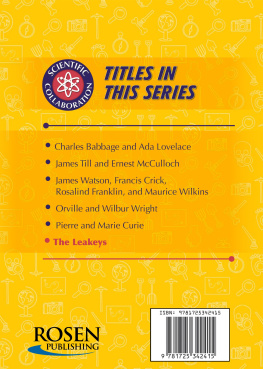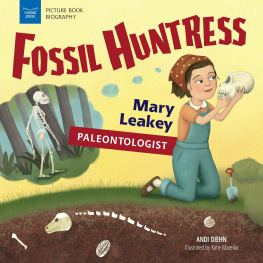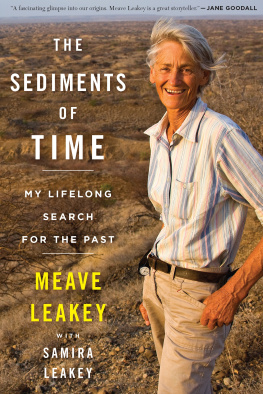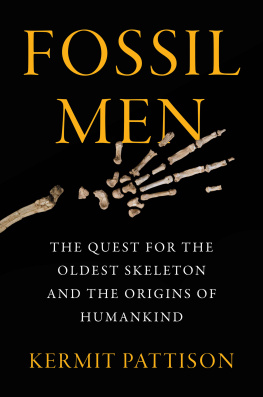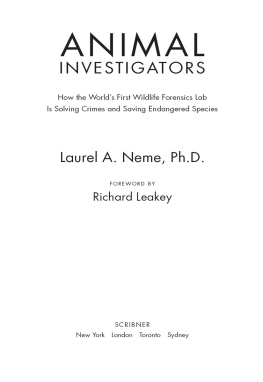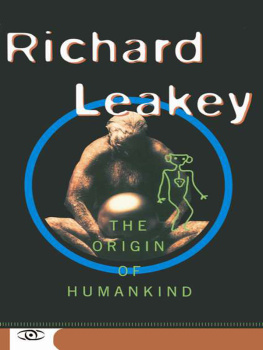Acknowledgments
This is the first full biography of Louis, Mary, and Richard Leakey and, although it is not authorized, it could not have been written without the familys great generosity, patience, and kind help. They kindly gave me unpublished letters, journals, diaries, and photographs and interrupted their busy lives on numerous occasions to talk to me about themselves, their science, their family, and colleagues.
In particular, I thank Richard Leakey, who was generous beyond measure. He invited me to join his 1984 and 1987 West Turkana expeditions and gave me unlimited access to the Leakey family archives at the National Museums of Kenya, as well as to his personal files. He willingly answered my numerous (and, Im sure, at times seemingly endless) questions and kindly introduced me to many of his colleagues and friends. I have been a guest in his camp and in his home, and if I have managed to capture some small part of the Leakey familys complexity, it is because of Richards unwavering and wholehearted support. Meave Leakey was equally kind and helpful, opening her and Richards home to me, and gently encouraging me to ask the sometimes difficult question.
My deepest thanks go also to Mary Leakey, who granted me numerous interviews and kindly gave me her personal letters. She welcomed my husband and me to her Olduvai Gorge home, and good-naturedly accompanied us on a tour of the gorges fossil sites as well as the hominid footprint site of Laetoli. She also wrote insightful and pithy replies to my many lettersalthough I know (because she told me so) that she often groaned when she saw one of my letters in her mail.
I was also warmly welcomed as a guest in the homes of Jonathan and Janet Leakey, and Philip and Valerie Leakey. They shared their memories about growing up in Kenya and thoughtfully answered my many questions.
The British side of the Leakey family was as hospitable and generous as the Kenyan. I owe a deep debt of gratitude to Frida, Louiss first wife, whose delightful memories of Louis and his first East African expeditions provided the core material for my books opening chapters. Frida was in her eighties when I met her; she picked me up at the Cambridge train station in a sports car with the top downdisplaying the same spunk that Im sure had attracted Louis to her. Sadly, she passed away shortly before I completed my book.
Frida and Louiss two children, Priscilla Davies and Colin, were kind and helpful from the moment we met, warmly welcoming me into their homes and sharing their memories with the same enthusiasm and good humor I had found among the Kenyan Leakeys. Colin even produced a book one evening about the Texan cowboy side of the Leakey familya branch that I have space only to mention in passing here.
I was extremely fortunate to meet Louiss sole surviving sibling, Julia Barham; his brothers wife, Beryl Leakey; and Fridas sister, Barbara Waterfield. All three women shared their wonderful memories of Louis with me; all three have also since passed away.
Although the Leakey family was cooperative, they exercised no control over the writing of the book and never asked to read the manuscript prior to publication. All interpretations and judgments in these pages are entirely my own.
I can never adequately thank the many people who talked to me about the Leakeysin person, by telephone, and by mail; who gave me letters, photographs, diaries, and journals; who offered me hospitality, read my manuscript, and kept up my courage. My deepest gratitude to all of these individuals, some of whom have died in the intervening years. For simplicitys sake, the list is alphabetical: Paul Abell, Issa Aggundey, Juliet Ament, Sharon Anderson, Peter Andrews, Margaret Avery, Antonia Bagshawe, Anna K. Behrensmeyer, Frances Bekafigo, Sir Michael Blundell, Bob Brain, Rod Brindamour, Frank Brown, Jean Brown, Fred E. Budinger Jr., Frances Burton, Karl Butzer, Bob and Heather Campbell, Judy Castel, J. Desmond Clark, Ron Clarke, Basil Cooke, Yves Coppens, Garniss Curtis, Glyn Daniel, Michael and Micky Day, Irven DeVore, Gabrielle Dolphin, Jill Donisthorpe, Bob Drewes, Kathy Eldon, Mary Catherine Fagg, Frank Fitch, Dian Fossey, Sir Vivian Fuchs, Birut Galdikas, Catherine Garnett, Alan Gentry, Diane Gifford-Gonzalez, Jan Gillett, Betty Goerke, Jane Goodall, Nancy Gonzalez, Richard Michael Gramly, Bill Graves, Gilbert Grosvenor, Mary Ann Harrell, Jack Harris, John Harris, Richard Hay, Cathryn Hosea Hilker, Andrew Hill, Ralph Holloway, Sarah Howard, F. Clark and Betty Howell, Elspeth Huxley, Lady Juliette Huxley, Glynn and Barbara Isaac, Toni Kay Jackman, Alan Jacobs, Lou Jacobs, Penelope Jenkin, Peter Jones, Jon Kalb, John and Joan Karmali, Kathryn (Dottie) Kasper, Sir Peter Kent, Kamoya Kimeu, Elisabeth and Barbara Kitson, Maxine Kleindienst, Leo Laporte, Joachim Lentz, Roger Lewin, Dora MacInnes, Wambua Mangao, Anthony Marshall, Graham Massey, Ernst Mayr, Daniel McCarthy, Christine and Ian McRae, Harry Merrick, Elizabeth Meyerhoff, M. E. Morbeck, Amini Mturi, Heselon Mukiri, Joseph Mungai, Ned Munger, Mongela Muoka, Mutevu Musomba, Joseph Mutaba, John and Pru Napier, Charles Nelson, Bernard Newsam, Teresia Nganga, Bernard Ngeneo, Charles Njonjo, Peter Nzube, Helen OBrien, Tom Odhiambo, Perez Olindo, Rosalie Osborn, Lita Osmundsen, Bea Patterson, Ethel Payne, David Pilbeam, Tom Plummer and Wahida Muhideen-Plummer, Merrick Posnansky, Richard Potts, Kitty Price, Bill, Debbie, and Dana Richards, Charles and Elizabeth Richards, Rosemary Ritter, Derek Roe, Louise Robbins, John T. Robinson, Alan Root, Michael and Cordelia Rose, Wade Rowland, Walter C. Schuiling, Judith Shackleton, C. Thurstan Shaw, Pat Shipman, Elwyn Simons, Ruth Dee Simpson, Mary Griswold Smith, John D. Solomon, T. Dale Stewart, Chris Stringer, W. E. Swinton, Maurice Taieb, Anne Thurston, Phillip V. Tobias, Joan Travis, Joan Uzzell, John Van Couvering, Hugo van Lawick, Elizabeth Vrba, Alan Walker, Sherwood Washburn, Ron Watkins, Henry West, Sam White, Leighton Wilkie, Lee Williams, Peter Williamson, Milford Wolpoff, Bernard Wood, Marie Wormington, E. Barton Worthington, and Adrienne Zihlman.
It should be noted that Donald Johanson, Tim White, and Vanne Goodall did not wish to be interviewed for this book. Neither Bethwell A. Ogot nor John Onyango-Abuje was available for interviews. Ogot declined, saying only, Silence is golden, while Onyango-Abuje has been very ill.
I also owe a deep debt of gratitude to Gideon Matwale, the head of the archives of the National Museums of Kenya, who shared his office and staff with me, located Leakey family files and related materials, and spent hours microfilming needed documents. He also introduced me to M. Musembi, the chief archivist at the Kenya National Archives, and his assistants Richard Ambani and Maina Keru, again tireless and resourceful workers. Japhet Otike and his staff at the library of the National Museums of Kenya were equally kind and helpful.
Many of the secondary source materials were collected for me by two excellent and enthusiastic research assistants: John Leedom at the University of California, Berkeley, and Eric Jones, then at Southern Oregon State College, Ashland. In Kenya, Moses Mrabu put in long hours locating documentsand in some cases, because of restrictions, copying them out longhand. In England, T. N. Cooper, Saul Dubow, A. Spanier, and Fiona Stewart ferreted out documents and articles from various libraries and archives for me; while in South Africa, Richard Lunz did the same. I also thank the following archivists, curators, and librarians and their institutions: A. R. Allan at the University of Liverpool; Nancy L. Boothe at the Woodson Research Center, Rice University; E. H. Cornelius and Ian F. Lyle at the Royal College of Surgeons, London; Beverley Emery at the Museum of Mankind Library, London; David W. Phillipson at the Cambridge University Museum of Archaeology and Anthropology; J. Pingree at the Imperial College of Science and Technology, London; H. Robinson at the Royal Society, London; and Malcolm G. Underwood at St. Johns College, Cambridge University. Thanks also to the librarians and staff at the archives of the British Museum of Natural History, London, and the Rhodes House, Oxford University.


